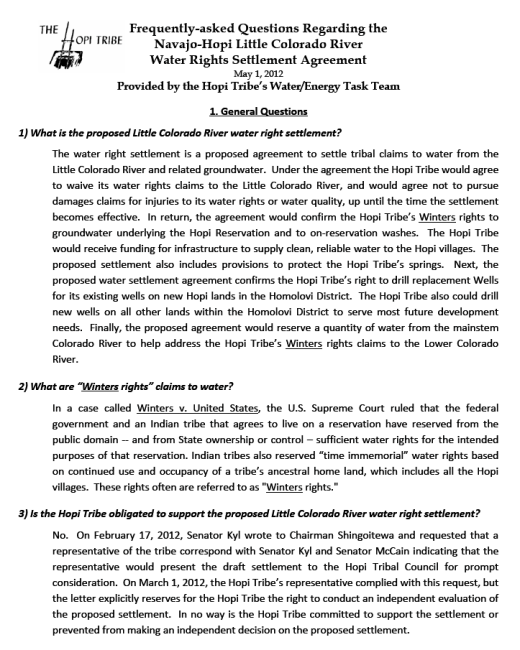November 8, 2012
The Honorable Ken Salazar
Secretary – Department of the Interior
1849 C Street, NW
Washington, DC 20240
Dear Secretary Salazar:
Mr. Secretary, I write this letter to you on behalf of our Hopi and Tewa Senom (People), our traditional leaders and our village governments concerning Senate Bill 2109, “Navajo and Hopi Little Colorado River Water Rights Settlement Act of 2012”. As you know, Arizona Senator Jon Kyl introduced S.2109 to the United States Senate on February 12, 2012. Arizona Senator John McCain co-sponsored this bill. And on February16, 2012, Arizona Congressman Ben Quayle introduced a companion bill, House Resolution No. 4067.
At a historic Hopi Tribal Council meeting on June 15, 2012, held at the Hotevilla Youth/Elderly Center on our reservation, the Hopi Tribal Council enacted Resolution H-072-2012 that formally rejected S.2109 by the Hopi Tribe. A copy of Resolution H-072-2012 is enclosed for your information.
The Hopi Tribal Council enacted this Resolution after our Hopi and Tewa villages, our traditional leaders, our village governments, and tribal members overwhelmingly objected to and rejected S.2109. Several of our past elected Hopi tribal leaders also objected to S.2109 and supported the enactment of Resolution H-072-2012. Enclosed are copies of proclamations and resolutions adopted by our villages and traditional leaders. Also enclosed is a copy of Action Item H-065-2012 endorsed by the past Hopi elected leaders which resulted in the passage of Resolution H-072-2012.
But, we understand Hopi Chairman LeRoy Shingoitewa and certain members of the Hopi Tribal Council will be attending a meeting at the Department of Interior, sponsored by your office, to discuss the proposed changes to S.2109. The Hopi and Tewa Senom vehemently object to this meeting and any attempt to revise S.2109 without prior consultation with us and without our concurrence.
Be advised that Chairman Shingoitewa, the Hopi Tribal Council and the Hopi Water & Energy Team do not have the authority to negotiate S.2109 and any amendments thereto. Resolution H-072-2012 specifically prohibits Chairman Shingoitewa and the Hopi Water & Energy Team from further negotiations of S.2109. This Resolution has never been amended or rescinded, so it is in full force and effect. Consequently, Chairman Shingoitewa does not have the authority to sign the Water Settlement Agreement on behalf of the Hopi Tribe.
The Constitution and By-Laws of the Hopi Tribe, adopted in 1936, is not like other typical Indian Reorganization Act (IRA) constitutions of other tribal nations. The Hopi Constitution acknowledges the traditional and inherent powers of our villages. Our traditional villages are autonomous villages that still maintain their “Inherent Aboriginal Sovereignty” and powers of self-government. Please refer to the enclosed copy of the Hopi Tribal Appellate Court’s Final Answer to Bacavi Village’s Certified Question of Law that addresses the traditional, inherent powers of our villages.
Our villages are the rightful owners of water rights. The authority to negotiate water rights is authority reserved to our villages; and is authority not delegated to the Hopi Tribal Council in the Hopi Constitution. The Hopi Constitution was a “boiler plate” constitution authored by and provided by the United States. As such, the United States already understands that any negotiation and agreement regarding our water rights can only be agreed to with full concurrence and approval of our villages.
Water right is a property right. It is a sacred right of our villages. Any action by Chairman Shingoitewa, the Hopi Tribal Council and other parties may be unconstitutional and may constitute a wrongful taking of property without just compensation under Federal and Hopi tribal law. The Indian Civil Rights Act of 1968 prohibits any Indian tribe from taking private property for public use without just compensation. Thus, our villages would have legitimate claims for compensation for the unlawful taking of their water rights if the Hopi Tribe and other parties proceed with negotiating and pursuing the passage of S.2109.
Mr. Secretary, water is sacred and is central to our Hopi way of life. As Hopi Senom, we have a sacred covenant with our caretaker, Maasau, to protect our traditions, ceremonies and our natural resources. Important matters such as land, water and other natural resources are properly addressed by our traditional leaders and villages. Therefore, we respectfully request that you facilitate the formal withdrawal of S.2109 and H.R. 4067 from the Congressional legislative process.
With Respect,
Benjamin H. Nuvamsa
Village of Shungopavi (Hönwugnwa – Bear Clan)
Former Hopi Tribal Chairman
Enclosures
cc: Honorable Senator Jon Kyl, United States Senate
Honorable Senator John McCain, United States Senate
Honorable Daniel Akaka, Chairman, Senate Committee on Indian Affairs
Honorable Ben Quayle, Representative, House of Representatives
Honorable Kevin Washburn, Assistant Secretary – Indian Affairs
Hopi Traditional Leaders
Hopi Villages
Hopi Tutuveni








